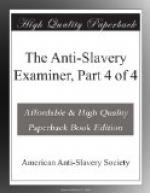ANSWER. This principle I utterly deny. All that Society has a right to demand is peaceful submission to its exactions:—consent they have neither the power nor the right to exact or to imply. Twenty men live on a lone island. Nineteen set up a government and say, every man who lives there shall worship idols. The twentieth submits to all their laws, but refuses to commit idolatry. Have they the right to say, “Do so, or quit;” or, to say, “If you stay, we will consider you as impliedly worshipping idols?” Doubtless they have the power, but the majority have no rights, except those which justice sanctions. Will the objector show me the justice of his principle? I was born here. I ask no man’s permission to remain. All that any man or body of men have a right to infer from my staying here, is that, in doing this innocent act, I think, that on the whole, I am effecting more good than harm. Lawyers say, I cannot find this right laid down in the books. That will not trouble me. Some old play has a character in it who never ties his neckcloth without a warrant from Mr. Justice Overdo. I claim no relationship to that very scrupulous individual.
OBJECTION XVI.
These clauses, to which you refer, are inconsistent with the Preamble of the Constitution, which describes it as made “to establish justice” and “secure the blessings of liberty to ourselves and our posterity:” And as, when two clauses of the same instrument are inconsistent, one must yield and be held void—we hold these three clauses void.
ANSWER. A specific clause is not to be held void on account of general terms, such as those of the preamble. It is rather to be taken as an exception, allowed and admitted at the time, to those general terms.
Again. You say they are inconsistent. But the Courts and the People do not think so. Now they, being the majority, settle the law. The question then is, whether the law being settled,—and according to your belief settled immorally,—you will volunteer your services to execute it and carry it into effect? This you do by becoming an officeholder. It seems to me this question can receive but one answer from honest men.
LAST OF ALL, THE OBJECTOR CRIES OUT,
The Constitution may be amended, and I shall vote to have it changed.
ANSWER. But at present it is necessary to swear to support it as it is. What the Constitution may become, a century hence, we know not; we speak of it as it is, and repudiate it as it is. How long may one promise to do evil, in hope some time or other to get the power to do good? We will not brand the Constitution of the United States as pro-slavery, after—it had ceased to be so! This objection reminds me of Miss Martineau’s story of the little boy, who hurt himself, and sat crying on the sidewalk. “Don’t cry!” said a friend, “it won’t hurt you tomorrow.”—“Well then,” said the child, “I won’t cry tomorrow.”




